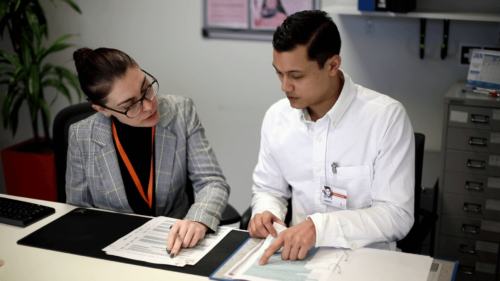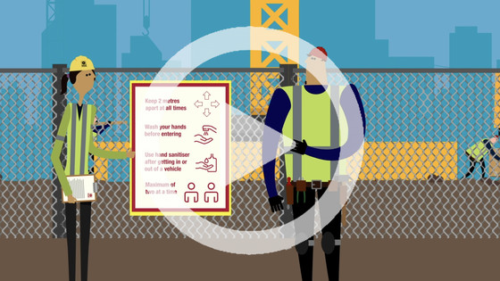Do you believe that health and safety are not essential aspects of the workplace? If so, think again. Occupational health and safety advisors ensure the health and safety of employees. In addition, they develop policies and procedures to prevent injuries, illnesses, and accidents.
Health and Safety Advisors (Health and Safety Advisers) are professionals who assist organisations in maintaining healthful and safe work environments. They provide employees and employers with safety advice, training, and support.
Health and Safety Advisors play a crucial role in helping ensure that workplaces are safe and that employees are aware of the risks associated with their job. Health and Safety Advisors typically have a background in safety management. As a result, they must understand complex safety information and communicate this information in a way that is easy for employees to understand.
Health and Safety Advisors typically work with a range of organisations, including local authorities, the construction industry, environmental health bodies, safety consultancies and manual handling specialists. They may also be employed by large companies or work as self-employed safety consultants. In short, a Health and Safety Advisor is responsible for promoting and ensuring safety in the workplace (e.g. occupational safety).
This includes creating and implementing up to date health and safety policies, investigating accidents and incidents, conducting risk assessments, and providing training to employers. If you’re interested in pursuing a career as a Health and Safety Adviser or safety consultant, keep reading to learn more about the role and the skills you need to succeed.

Health and Safety Advisor Responsibilities
- Promote and ensure safety in the workplace.
As a Health and Safety Advisor, you’re responsible for helping to keep your company safe for everyone who works there. This includes developing programs to prevent injuries, conducting inspections of equipment and building structures, investigating accidents and incidents, providing training about health and safety dangers, addressing unsafe work behaviours or other concerns. You’ll also take steps to make sure that your workplace complies with all relevant local regulations regarding safety procedures.
- Create policies related to health and safety industry issues within the organisation.
Developing health and safety policies and guidance is one of the key responsibilities of a Health and Safety Advisor. Your policies should be made available to employees at all times and should be regularly reviewed. It’s essential to make sure that they’re comprehensive enough to cover general safety concerns and specific hazards in the workplace.
- Investigate accidents and incidents, conduct risk assessments, and provide training for employees
In the course of your work as a Health and Safety Advisor, you’ll investigate any accidents or injuries that occur within the organisation. You’ll also review danger reports to determine possible risks that need addressing. If necessary, you’ll recommend changes to build structures, equipment, operations procedures or other areas of concern to eliminate hazards. As part of your role at an organisation, you’ll provide relevant training so that employees know what behaviours can keep them safe on the job.

Safety Qualifications Health and Safety Professionals Need
There aren’t specific degree-level qualifications required to work as a health and safety advisor. That being said, you should have a solid understanding of workplace safety legislation and health and safety laws and be committed to learning more about the latest industry trends. It’s helpful if you have a strong knowledge of health and safety regulations in your area or within your industry. You should also be able to demonstrate excellent verbal and written communication skills. Safety advisers should have excellent customer service skills. They must investigate accidents, incidents and near misses, keep records of these incidents and write reports.
- Educated in occupational health and safety
You don’t need an advanced degree to become a Health and Safety Advisor. If you’re already qualified as an occupational health and safety professional, then that’s all the training that you’ll need. However, if your experience is more generalised, you might consider completing a program designed for professionals who are new to the field of OHS. Such courses will provide information about relevant legislation governing workplace health and safety methods for conducting risk assessments. You’ll also learn how to educate employees about hazards in the workplace so that they can take preventative action.
- Familiarity with risk management practices
Successful Health and Safety Advisors need to be familiar with various risk management practices to determine how best to deal with health and safety concerns within their organisation. For example, you’ll need to know about hazard identification and control, incident investigation techniques, accident analysis. This will enable you to accurately identify the root cause of accidents or injuries in your workplace.
- Skilled at communicating
As a Health and Safety Advisor, you’ll spend much of your time training employees about important health and safety hazards that they might not necessarily be aware of or fully understand.
You’ll also play an important role in investigating incidents, so it’s critical that you’re able to communicate effectively with everyone involved—your employer, employees who were involved in the incident or suffered an injury.
Comfortable with conflict resolution Disagreements about health and safety issues can sometimes arise among employees or between employees and management. As a Health and Safety Advisor, you’ll need to handle these types of conflicts professionally so that they don’t escalate into more significant problems. Resolving such issues quickly will help ensure the continuation of a positive work environment for everyone involved.
- Detail-oriented
Many health and safety incidents can be caused by small details that were overlooked or ignored. As such, a Health and Safety Advisor needs to remain detail-oriented in order to identify these issues early on. Attention to detail will also help you while conducting incident investigations—if you’re not careful, you could miss something important!
- Good time management skills
Health and Safety Advisors need to be good at managing their time since they often have multiple responsibilities throughout the day. You might often find yourself balancing your time between performing risk assessments, communicating with employees about health and safety concerns and investigating incidents. In addition to doing all of this work quickly and efficiently, you should make sure that it’s all completed in a timely manner.

- Organised
In addition to maintaining a level of detail while conducting investigations, Health and Safety Advisors should also be organised to avoid missing anything or losing track of important information. For example, you might have access to sensitive company information as well as personal health and safety details from employees, so it’s important to keep everything organised and secure at all times.
- Ability to work under pressure
As a member of management or leadership, you’ll often find yourself under pressure due to your multiple responsibilities. For example, you might need to address an emergency health and safety issue within your workplace immediately after completing another task, such as conducting a risk assessment. In each case, you should be able to remain calm and handle the situation in a timely manner.
- Accountable
Health and Safety Advisors must be held accountable since you’ll often have access or control over sensitive information about your employer or employees. Your actions will directly affect other people, so it’s essential that you always maintain a high level of accountability to avoid causing unnecessary harm or damage. This is especially true if you accidentally overlook any health and safety issues during risk assessments.
- Discreet
Being discreet as a Health and Safety Advisor is important because much of your work will involve private or personal employee information. You might also regularly deal with sensitive company information such as budgets and customer lists, so you shouldn’t share anything you shouldn’t be sharing.
- Good written and oral communication skills
Employees will often come to you with their health and safety concerns, and it’s your job to address them professionally. If you cannot communicate this information effectively or if an employee does not fully understand the situation, then a lack of resolution might lead to further problems down the line. To avoid such situations, it’s critical that you develop strong written and verbal communication skills since they’re essential for anyone working in management or leadership roles.
- Collaborative
As a Health and Safety Advisor, you should always try to collaborate with other employees when conducting risk assessments or dealing with any issues that arise from these assessments so that you can get multiple perspectives. Even if one person caused an issue, many other factors might have contributed to the situation—for example, another employee might not have checked that everything was safe before starting their shift which led to the problem. You should always try to consider all of these perspectives when dealing with health and safety issues so that your decisions are well-rounded.

- Ability to work under pressure
As a Health and Safety Advisor, there will be times when you’ll need to act quickly to keep employees, customers or equipment safe. This often means that you won’t have time for much planning or preparation before doing something—you need to react, adapt and overcome the situation in real-time. Even your day-to-day tasks such as conducting risk assessments should be handled in a timely manner.
- Good decision-making skills
You might find that you’re required to make important decisions on behalf of your organisation, whether it’s related to health and safety or not. For example, you might need to choose a supplier for a new piece of equipment, affecting all other areas of business operations. You should always try to gather as much information as possible before making a decision so that you have the knowledge necessary to make an informed choice—if you cannot solve the problem yourself, then seek advice from someone else with the relevant expertise involved.
- Creative
A Health and Safety Advisor needs to be creative since there are a number of different things that a Health and Safety Advisor might have to do from one day to the next. You’ll have to think outside of the box to solve problems or overcome challenges, so having a creative mindset is important.
- Good at multitasking
Since you might have many different projects going on simultaneously as a Health and Safety Advisor, being good at multitasking is key. You need to be able to remain organised and focused enough to don’t lose track of what needs your attention most urgently while also being attentive enough to understand why a given individual has brought up a particular health and safety concern.
- Respectful towards others
Being respectful towards other people is essential when working with employees, customers and suppliers. Maintaining good relationships is always helpful since they’ll be more willing to work with you if they like or understand you. No one wants to get on the bad side of their Health and Safety Advisor since that could lead to a number of problems down the line in terms of conducting business effectively.
- Unbiased
It’s important for a Health and Safety Advisor to remain unbiased since they need to consider all health and safety concerns without favouring any specific group of people. Even if a certain individual caused an issue, it’s not your job to punish them—instead, try to find out what happened so that you can prevent similar issues from occurring in the future. Your aim should always be to improve health and safety standards, not to blame or punish people.

- Able to work on own initiative
You might find yourself with many responsibilities as a Health and Safety Advisor, which means that you’ll have a lot on your plate from day-to-day. To stay productive, you need to be able to work on your own initiative to handle everything required by the organisation effectively. Even if someone else has been assigned the task of carrying out a certain assignment, it’s still important for you to follow up since there might be additional steps involved or information required before they can start working properly.
- Good at public speaking
At some point as a Health and Safety Advisor, you’ll probably be called upon to speak in front of an audience to train staff about health and safety measures. This means that you’ll need to feel comfortable speaking in public so that you can give a professional presentation without becoming too nervous or anxious. If necessary, try practising in front of a mirror so that you know what it will look like when someone is recording your presentation or taking notes.
Safety advisers work
Health and Safety Advisors play a crucial role in the working environment of any organisation, ensuring that everyone is safe. If you want to be successful in your new career as a Health and Safety Advisor, it’s important to take the time to learn about how this profession operates so that you can start making an impact right away. When working with employees or customers, always remain respectful while maintaining good relationships at all times. You’ll need to have a creative mindset, which means thinking outside of the box when solving problems or overcoming challenges.
If you’re looking for a new and exciting career, becoming a Health and Safety Advisor could be the perfect next role for you. This profession is essential for any organisation, ensuring that everyone is safe at all times. To be successful in this field, it’s important to take the time to learn about how it operates so that you can start making an impact right away. When working with employees or customers, always remain respectful while maintaining good relationships at all times.
Job alerts
Are you a highly motivated, enthusiastic and experienced Health and Safety professional looking for new opportunities? Contact us now for further information on health safety advisor jobs.
